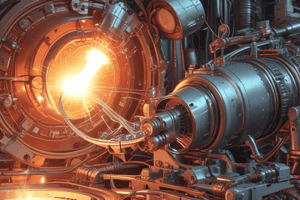Podcast
Questions and Answers
What distinguishes welding from brazing and soldering?
What distinguishes welding from brazing and soldering?
- Welding does not require a filler material
- Welding uses lower temperatures
- Welding does not involve the use of heat
- Welding melts the base metal (correct)
What is typically added to the joint during welding?
What is typically added to the joint during welding?
- Oil
- Water
- Filler material (correct)
- Air
Which energy sources can be used for welding?
Which energy sources can be used for welding?
- Hydroelectric, nuclear, biomass
- Coal, oil, natural gas
- Wind, solar, geothermal
- Gas flame, electric arc, laser (correct)
What is used to protect the filler metals or melted metals during welding?
What is used to protect the filler metals or melted metals during welding?
What can be used in conjunction with heat to produce a weld?
What can be used in conjunction with heat to produce a weld?
What is the primary purpose of using a shielding gas in welding?
What is the primary purpose of using a shielding gas in welding?
Which welding process uses a consumable electrode that also functions as the filler metal?
Which welding process uses a consumable electrode that also functions as the filler metal?
What is the function of flux in flux-cored arc welding (FCAW)?
What is the function of flux in flux-cored arc welding (FCAW)?
What is the process of joining two or more pieces of metal by melting and fusing them together?
What is the process of joining two or more pieces of metal by melting and fusing them together?
What gas is commonly used to protect the weld area from atmospheric contamination during welding?
What gas is commonly used to protect the weld area from atmospheric contamination during welding?
What is the purpose of a filler metal in welding?
What is the purpose of a filler metal in welding?
Flashcards are hidden until you start studying
Study Notes
Distinguishing Welding, Brazing, and Soldering
- Welding involves melting and fusing metal pieces together, unlike brazing and soldering, which join metals without melting the base materials.
- Brazing uses a filler metal with a melting point above 450°C, while soldering employs a filler with a lower melting point (below 450°C).
Welding Joint Additives
- Typically, a filler metal is added to the joint during welding to enhance strength and create a solid connection.
Energy Sources for Welding
- Various energy sources can be utilized for welding, including electricity, gas flame, laser, and electron beam.
Protection during Welding
- A shielding gas, often argon or carbon dioxide, is used to protect the filler metals and molten metals from atmospheric contamination during the welding process.
Heat and Other Methods in Welding
- In addition to heat, pressure can be used to produce a weld, particularly in processes like resistance welding.
Purpose of Shielding Gas
- The primary purpose of using shielding gas in welding is to prevent oxidation and contamination of the weld area, ensuring a clean and strong weld.
Consumable Electrode Welding Process
- Gas Metal Arc Welding (GMAW) uses a consumable electrode that functions simultaneously as the filler metal during the welding process.
Function of Flux in FCAW
- In flux-cored arc welding (FCAW), the flux serves to protect the weld pool and helps in slag formation, ensuring a cleaner weld.
Key Process of Welding
- The process of welding involves joining two or more pieces of metal by melting and fusing them together, creating a permanent bond.
Commonly Used Shielding Gas
- Argon is a commonly used gas to protect the weld area from atmospheric contamination, contributing to weld quality.
Role of Filler Metal
- The purpose of a filler metal in welding is to provide additional material to the weld joint, enhancing strength and stability of the connection.
Studying That Suits You
Use AI to generate personalized quizzes and flashcards to suit your learning preferences.




